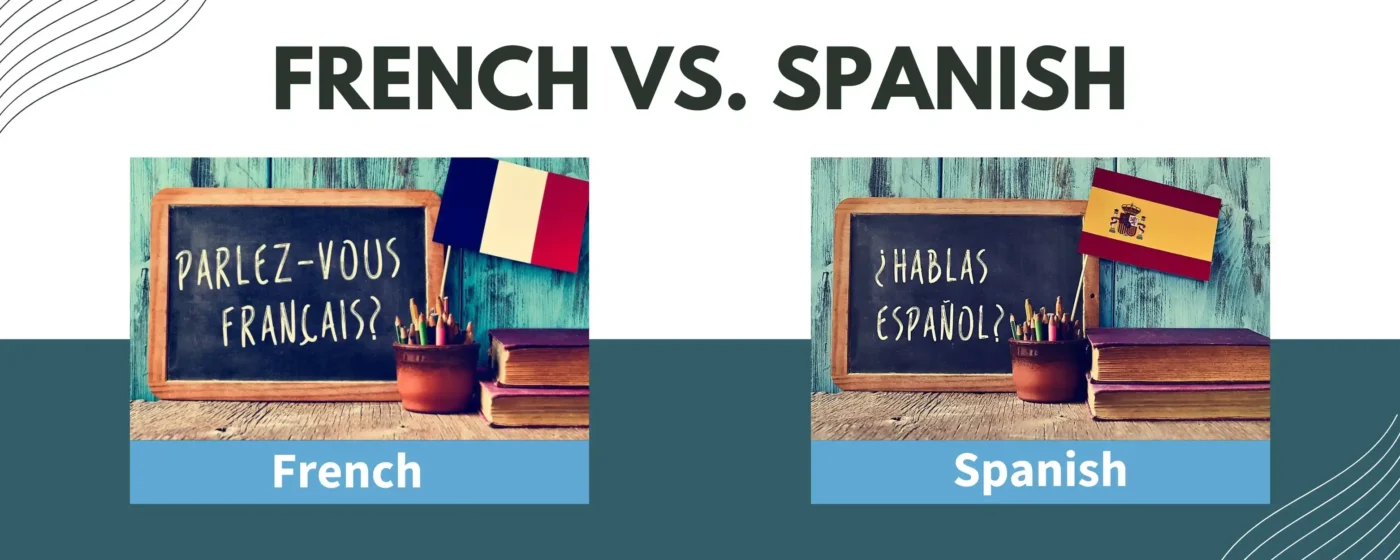Imagine Sumit, a young engineering graduate finds himself at a crossroads. He envisioned a bright future with international opportunities, but which language would be his golden ticket: German or French? Both seem filled with promises of rich culture and structurally sound economies, making them popular choices for language learners worldwide. Well, we’re here to help you make this decision, so that you don’t face a challenge trying to decide the language leading the path to your future. Allez-y!
Key Takeaways
- The French language is spoken by around 320 million people in the world, making it more widespread than German’s 130 million.
- The German language is ideal for a career in engineering, technology, and finance, while French in diplomacy, fashion, and the luxury sectors.
- There is French language is a romance language, and the grammar is simpler but has tricky pronunciation and silent letters, while German is grammar features a challenging case system but is phonetic.
- The German language is valued for higher education in STEM fields, with public universities often being free, while the French language leads in arts, business, and international relations.
- The languages you choose should match your professional and travel interests, along with the regions or industries you want to access.
French vs German: A Comparison of Popularity & Global Reach
French boasts a high number of speakers worldwide, around 320 million, compared to German’s considerably measly 130 million. This number included both native as well as non-native speakers.
In the business world, German is very important because it’s the language of Europe’s strongest economy as well as a top-notch player in engineering and manufacturing. Knowing German can be an added advantage in domains like banking, and technology. French is often favoured in diplomacy, fashion, hospitality, and international organizations. German is widely used in engineering, technology, and automotive industries.
French, on the other hand, is next to crucial for global business, especially in luxury items, clothes, and travel. It’s also an official language in 29 countries. Both languages are super useful for tourism. Here lies the dilemma: German speakers travel a lot, and French is spoken in many popular tourist spots.
Language Families
French and German may both be important European languages, but they come from very different language families. French is a Romance language, part of the larger Indo-European language family, and shares its roots with other Romance languages like Spanish, Italian, and Portuguese.
This means that if you already know one Romance language, you’ll notice similarities in vocabulary and grammar, making it easier to learn another. German, on the other hand, is a Germanic language, closely related to English, Dutch, and Swedish. For English speakers, this connection often means that German words and sentence structures can feel more familiar, even if the grammar is more complex.
Which Language is Easier to Learn?
Grammar & Sentence Structure
German uses a system of four cases (nominative, accusative, dative, genitive) which change the endings of nouns, articles, and adjectives based on their role in a sentence (subject, direct object, indirect object, possessive). German grammar is known for its complex case system and structured rules, which create a flexible word order but require memorizing many variations.
French, on the other hand, assigns grammatical genders to every noun, there are two grammatical genders in French (masculine or feminine), while German has three. This means articles and adjectives must agree in gender, which can also be challenging. French typically follows a subject-verb-object sentence order, similar to English. French grammar is generally less complex than German grammar in terms of cases, but it may have more exceptions and irregularities.
Pronunciation & Spelling
German is often considered more phonetic because words are (mostly) pronounced as they are spelled. While there are some nuances with the consonant sounds, the link between spelling and pronunciation is quite direct. German pronunciation is generally straightforward and easy to follow, which can be helpful for learners.
French, however, frequently has silent letters, especially at the end of words (For example: ‘s’, ‘t’, ‘d’). French pronunciation is less straightforward, often spoken faster, and includes silent letters and nasal sounds, making it a more challenging aspect for learners. Additionally, ‘liaisons’ occur where a normally silent final consonant of one word is pronounced and linked to the beginning of the next word if it starts with a vowel or silent ‘h’, creating a fluid but less predictable sound.
German sounds are often more distinct and robust, while French sounds are more fluid and melodic. Listening to people speaking German and French can help learners notice both the similarities and differences in pronunciation, which may ease the language learning process for speakers of either language.
For beginners, French often feels easier initially due to its similarity in vocabulary to English and less rigid word order. However, its complex pronunciation and silent letters can be challenging. German, while having a more complex case system, is highly phonetic, making pronunciation more straightforward once rules are learned.
When it comes to proper nouns, German capitalizes all nouns, while French only capitalizes proper nouns, which is an important distinction in spelling and grammar between the two languages.
Boost your language skills with the best websites and apps to learn French online in 2025 for effective, flexible learning anytime.
Career & Job Market Opportunities
When it comes to job prospects, both German and French open doors in different, yet equally respected fields. The German language is highly valued in the business, technology, and engineering sectors, especially in major markets like Germany, the US, and parts of Asia, due to Germany’s strong economy and leading position in manufacturing and innovation. The German language is also essential in scientific writings and modern journals, particularly in engineering and technical fields, making it one of the most critical languages for professionals and researchers. Roles in automotive, IT and finance often see a high demand for German speakers.
French, meanwhile, is significant in international relations, diplomacy, luxury goods, fashion, and tourism. Its broad reach across 29 official countries makes it crucial for global business, especially in international organizations like the UN and EU.
To truly boost your career potential with some language learning resources, consider exploring the resources at La Forêt French Class. They also offer expert guidance and tailored programs to help you achieve fluency and unlock exciting global opportunities!
Need French Learning Shortcuts?
La Forêt’s tutors have tips to boost fluency faster. Make every minute count!
Travel & Cultural Benefits
Learning either of these two languages makes tourism far far better than just knowing English!
With French, you can explore romantic places like Paris, charming parts of Belgium, and the Swiss Alps. French is spoken as a native tongue by millions of native French speakers across Europe, Africa, and the Americas, making it valuable for travel and communication. There are also different French languages and dialects in various regions, adding to the richness of your experience. While German opens up vibrant cities like Berlin and Munich and the beautiful parts of Austria and Switzerland. Outside Europe, French is super useful in places like Quebec, Canada, and many countries in Africa, helping you connect with different cultures.
Both languages also open a world full of culture. Knowing French, you can read amazing books by authors like Victor Hugo, and enjoy French food, which is famous worldwide for its delicious pastries and hearty dishes. However, German culture offers deep philosophical ideas from thinkers like Kant, great books from Goethe, and a rich history of German movies. And don’t forget German food, with its tasty sausages and pretzels!
Which Language is More Useful for Higher Education in the European Union?
Both France and Germany boast reputed world-class universities. Germany’s Technical University of Munich and Heidelberg University consistently rank high, especially for STEM fields. While France’s Université PSL and Institut Polytechnique de Paris are relatively stronger in arts, business, and engineering. For international students, German public universities often have minimal or no tuition fees, while French public universities have moderate fees. Language requirements vary: German-taught programs typically need TestDaF or DSH (C1 level), while French programs require DELF/DALF (B2 for undergraduates).
Final Verdict – Which One Should You Learn?
When deciding between French and German, it’s important to consider the key differences in grammar, pronunciation, sentence structure, and global reach. French is known for its melodic pronunciation and simpler verb tenses, while German features noun cases and a more complex sentence structure. These distinctions can impact how easy or challenging each language is to learn and use.
Ultimately, the crucial choice comes down to a German vs French decision based on your individual aspirations. If you want to learn French, you’ll gain access to a language with strong cultural appeal, international influence, and opportunities in diplomacy, luxury, and tourism. On the other hand, learning German offers significant benefits for careers in business, engineering, manufacturing, and technology, as well as access to the economic powerhouse of Europe.
Don’t make this decision hastily. Consider your interests, aptitudes, passions, professional ambitions, and last but not the least – travel desires – to make the most informed decision.
You can visit La Forêt French Class for French language related courses as well as resources!
Enhance your language skills by exploring how to learn French with ChatGPT using smart, interactive techniques and daily practice tips.
Frequently Asked Questions
1. Since English is a Germanic language, shouldn’t German be much easier to learn?
Ans: While English and German are both Germanic languages, which can make learning German somewhat easier for native English speakers due to shared roots and similar structures, English has also borrowed heavily from French and Latin over centuries. This means English speakers will find familiar vocabulary in both languages. Additionally, both French and German use the Latin alphabet, so native English speakers do not need to learn a new writing system, making reading and writing more accessible. However, your native tongue can influence how quickly you pick up a new language—if it shares roots or features with the target language, it may be easier to learn. German’s grammar structure, particularly its cases, is quite different from modern English, which can be a challenge!
2. What are some resources to learn these languages online?
Ans: For French, you can use Duolingo, Babbel, and La Foret French Class Blog. For German, you can try DW Learn German, Goethe-Institut, and Easy German on YouTube.





